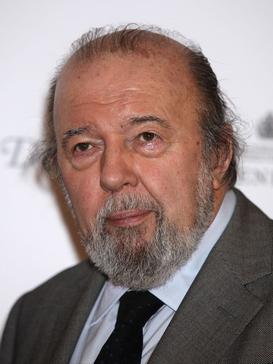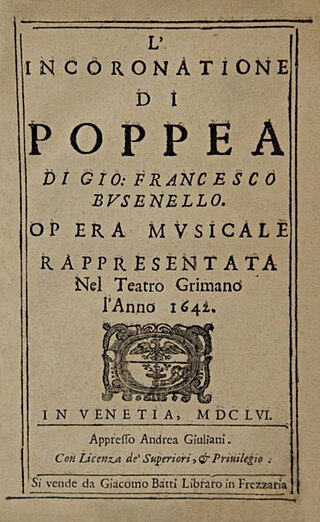Raymond John Leppard was a British-American conductor, harpsichordist, composer and editor. In the 1960s, he played a prime role in the rebirth of interest in Baroque music; in particular, he was one of the first major conductors to perform Baroque opera, reviving works by Claudio Monteverdi and Francesco Cavalli. He conducted operas at major international opera houses and festivals, including the Glyndebourne Festival where he led the world premiere of Nicholas Maw's The Rising of the Moon, the Metropolitan Opera and the Royal Opera House. He composed film scores such as Lord of the Flies and Alfred the Great.

Sir Peter Reginald Frederick Hall CBE was an English theatre, opera and film director. His obituary in The Times declared him "the most important figure in British theatre for half a century" and on his death, a Royal National Theatre statement declared that Hall's "influence on the artistic life of Britain in the 20th century was unparalleled". In 2018, the Laurence Olivier Awards, recognizing achievements in London theatre, changed the award for Best Director to the Sir Peter Hall Award for Best Director.

Rusalka, Op. 114, is a 1901 opera by Antonín Dvořák. The Czech libretto was written by the poet Jaroslav Kvapil (1868–1950) based on the fairy tales of Karel Jaromír Erben and Božena Němcová. A rusalka is a water sprite from Slavic mythology, usually inhabiting a lake or river. Rusalka was the ninth opera Dvořák composed. It is Dvořák's most successful opera and belongs to the repertoire of all world opera scenes.

John Nicholas Maw was a British composer. Among his works are the operas The Rising of the Moon (1970) and Sophie's Choice (2002).

L'incoronazione di Poppea is an Italian opera by Claudio Monteverdi. It was Monteverdi's last opera, with a libretto by Giovanni Francesco Busenello, and was first performed at the Teatro Santi Giovanni e Paolo in Venice during the 1643 carnival season. One of the first operas to use historical events and people, it describes how Poppaea, mistress of the Roman emperor Nero, is able to achieve her ambition and be crowned empress. The opera was revived in Naples in 1651, but was then neglected until the rediscovery of the score in 1888, after which it became the subject of scholarly attention in the late 19th and early 20th centuries. Since the 1960s, the opera has been performed and recorded many times.

L'Ormindo is an opera in a prologue and three acts by Francesco Cavalli to an original Italian libretto by Giovanni Faustini. The manuscript score is held at the Biblioteca Marciana in Venice, while a copy of the original libretto has been digitized by the Library of Congress. The opera has set numbers with recitative, and is set in Anfa (Casablanca), in the Mauri kingdom of Fessa (Fez).
Jonathan Dove is an English composer of opera, choral works, plays, films, and orchestral and chamber music. He has arranged a number of operas for English Touring Opera and the City of Birmingham Touring Opera, including in 1990 an 18-player two-evening adaptation of Wagner's Der Ring des Nibelungen for CBTO. He was Artistic Director of the Spitalfields Festival from 2001 to 2006.
David Bruce is a British composer and a YouTuber.

Cathleen ni Houlihan is a one-act play written by William Butler Yeats and Lady Gregory in 1902. It was first performed on 2 April of that year and first published in the October number of Samhain. Lady Gregory wrote the naturalistic peasant dialogue of the Gillane family, while Yeats wrote Cathleen Ni Houlihan's dialogue.
Alan Beverley Cross was an English playwright, librettist, and screenwriter.
The Rising of the Moon is an Irish ballad. The title may also refer to:
Richard Van Allan CBE was a versatile British operatic bass singer who had a lengthy career.
Julian Gavin is an Australian-born British operatic tenor who has sung leading roles both in the United Kingdom and internationally. His full-length opera recordings include Don José in Carmen and the title roles in Ernani and Don Carlos for Chandos Records.
Rae Woodland was a British soprano who studied with Roy Henderson. Her debut was as Queen of the Night at Sadlers Wells. She sang in many European festivals, and debuted at Covent Garden in La sonnambula with Joan Sutherland and Luciano Pavarotti. She was first asked to sing for Benjamin Britten on the English Opera Group's tour of Russia, and played many roles for him subsequently. She also created roles for Gottfried von Einem, Nicholas Maw and Sir Arthur Bliss, and made many live broadcasts for the BBC, from the RAH Proms to Friday Night is Music Night. She retired from the opera stage in 1984. She then taught singing at the Royal Academy of Music in London, and at the Britten-Pears School in Snape Maltings on the invitation of Sir Peter Pears.
The Glyndebourne Label is a UK-based record label founded in 2006 to release live recordings of Glyndebourne Festival Opera performances.
The Lodger is an opera in two acts composed by Phyllis Tate. The libretto is by David Franklin, after the 1913 novel of the same name by Marie Belloc Lowndes. The opera was commissioned by the Royal Academy of Music, with a grant from the William Manson Fund, and the premiere took place there on 16 July 1960.
Anne Elizabeth Howells was a British operatic mezzo-soprano.
Hamlet is an opera in two acts by Australian composer Brett Dean, with an English libretto by Matthew Jocelyn, which is based on Shakespeare's play of the same name. The libretto uses "as little as 20 per cent" of the play's text and also takes inspiration from the "first quarto" as it "offers a different view on certain moments".
The Yellow Sofa is an opera by the British composer Julian Philips, with a libretto by writer and director Edward Kemp, based on the novella Alves & Co. by Eça de Queiros.
Annon Lee Silver was a Canadian lyric soprano singer. She made her opera debut at the Glyndebourne Festival Opera in 1963 and had leading operatic roles throughout her career. Silver was a member of the Oper Frankfurt and performed with the Phoenix Opera and the Welsh National Opera. She gave master classes on BBC Television and performed at The Proms.






